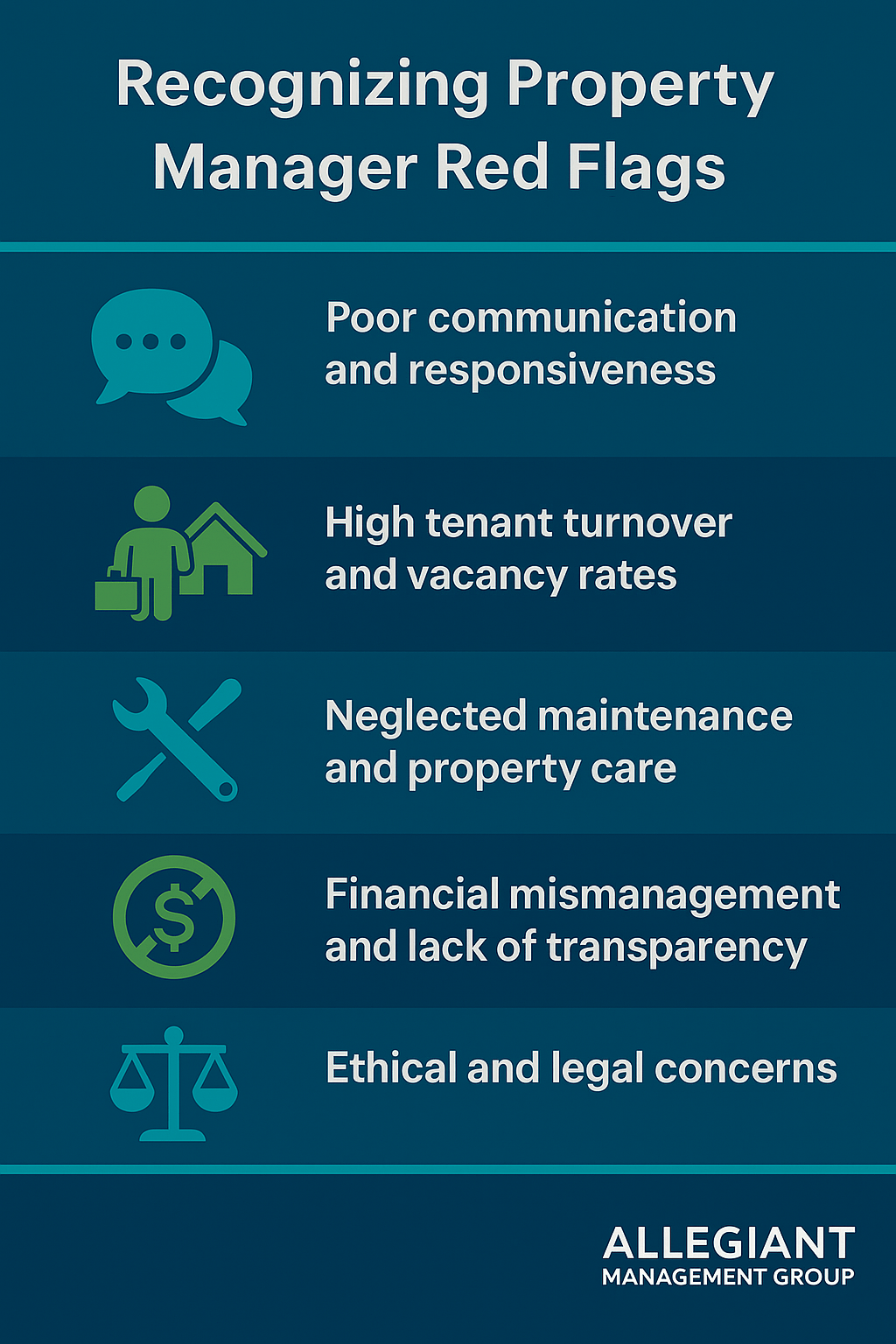Last Updated: September 27, 2025
📌 Table of Contents
- Recognizing the Red Flags
- Poor Communication & Responsiveness
- High Tenant Turnover & Vacancies
- Neglected Maintenance & Care
- Financial Mismanagement & Transparency
- Ethical & Legal Concerns
- Legal Considerations Before Firing
- Reviewing Your Agreement
- Termination Clauses & Penalties
- Compliance with State & Local Laws
- Firing Your Property Manager: Steps
- Documenting Issues
- Writing & Delivering the Termination Letter
- Managing the Transition
- After Firing: What to Do Next
- Immediate Stabilization Steps
- Selecting a New PM Company
- Learning for Future Success
- Conclusion
- Need a Better Property Manager?
- FAQs
Is It Time to Fire Your Property Manager?

Property management is a crucial part of protecting asset value and tenant satisfaction. But not all managers meet expectations—or the terms of your agreement. If you’re weighing a change, this guide covers red flags, legal considerations, and a step-by-step process to transition smoothly.
Recognizing the Red Flags
Ignoring warning signs can harm your investment and tenant experience. Key indicators it may be time to reconsider your management arrangement:
- Poor communication and responsiveness
- High tenant turnover and vacancy rates
- Neglected maintenance and property care
- Financial mismanagement and lack of transparency
- Ethical and legal concerns

Poor Communication and Responsiveness
Effective, timely communication is foundational. If calls or emails go unanswered, expect unresolved issues, frustrated tenants, and reputational damage.
High Tenant Turnover and Vacancy Rates
Frequent non-renewals and elevated vacancies often signal deeper management problems or weak marketing. Some turnover is normal; a steady pattern is not.
Neglected Maintenance and Property Care
Proactive maintenance preserves value and NOI. Deferred repairs drive complaints, vacancies, and capital costs.
Financial Mismanagement and Lack of Transparency
Trust hinges on clean books. If financial reports are inconsistent or late, press for clarity. Opaque rent/expense handling is a major red flag.
Ethical and Legal Concerns
Discrimination, illegal leasing practices, or local law violations expose owners to risk. A manager’s integrity directly impacts safety, reputation, and liability.
Legal Considerations Before Firing Your Property Manager

Review contracts and understand governing rules before acting. A brief consultation with counsel helps prevent missteps.
Reviewing Your Property Management Agreement
Your property management agreement dictates termination, notice periods, and penalties. Know these terms to plan a smooth, compliant exit.
Understanding Termination Clauses and Penalties
Termination clauses specify notice length and conditions. Budget for any early termination fees or outstanding costs to avoid surprises.
Compliance with State and Local Laws
Procedures can vary by jurisdiction (e.g., notice, tenant communication, escrow handling). Adhere to local requirements to avoid fines and disputes.
Firing Your Property Manager: Steps to Take

- Review your management agreement (termination terms, notice).
- Document performance issues thoroughly.
- Draft a clear, concise termination letter.
- Deliver notice per the contract (email/registered mail/in person).
- Prepare for disputes and follow-ups.
- Plan immediate post-termination operations (rent, maintenance, access).
Documenting Issues and Performance Problems
Keep organized records: dated incidents, emails, reports, tenant complaints. Documentation supports a defensible decision and smoother transition.
Writing and Delivering the Termination Letter
Be precise and professional. Cite contract sections and facts. Meet notice requirements and use the delivery methods specified (e.g., registered mail).
Managing the Transition and Protecting Your Property
Assign responsibility for rent collection, maintenance triage, and tenant communications immediately. Secure docs, keys, banking, and vendor access from the outgoing manager.
After Firing Your Property Manager

Stabilize operations fast: clear tenant updates, maintenance backlog review, and records audit. Reassure residents with transparent timelines and contacts.
Immediate Steps to Stabilize Property Management
Personally oversee rent collection, emergency work orders, and tenant notices. Financial and transparency build confidence during the handoff.
Selecting a New Property Management Company
Evaluate track record, reviews, and fit. Match needs with a management company experienced with similar assets. Interview for responsiveness, systems, and reporting standards.
Learning from the Experience for Future Success
Set clearer KPIs, SLAs, and termination language in the next agreement. Schedule regular performance reviews to stay aligned.
Conclusion
Firing a property manager is a strategic move to protect your investment. Spot issues early, follow the contract, and run a tight transition to preserve NOI and resident satisfaction.
Need a Better Property Manager in Central Florida?

At Allegiant Management Group, we turn property stress into property success. Whether you’re recovering from a bad experience or ready for better service, we’re here to help.
- Local Expertise
- Transparent Accounting
- Trusted by Investors Across Central Florida
📞 Schedule Your Free Consultation
Frequently Asked Questions (FAQs) - When Considering Firing Your Property Manager
How do I fire my property manager in Florida?
Review your contract, document issues, give written notice as required, and follow Florida laws regarding notice and tenant communications.
Can I switch property managers mid-lease?
Yes. The lease remains in force; management changes. Notify tenants and vendors promptly for a smooth handoff.
Do I need a reason to terminate my property manager?
Many agreements permit termination with notice. Still, document performance or legal concerns to support your position.
Will my tenants be affected if I fire the manager?
Handled well, they shouldn’t be. Communicate early, confirm maintenance/rent processes, and share updated contact info.
Disclaimer: This article is for informational purposes only and not legal advice. Consult an attorney before making contractual or legal decisions.



